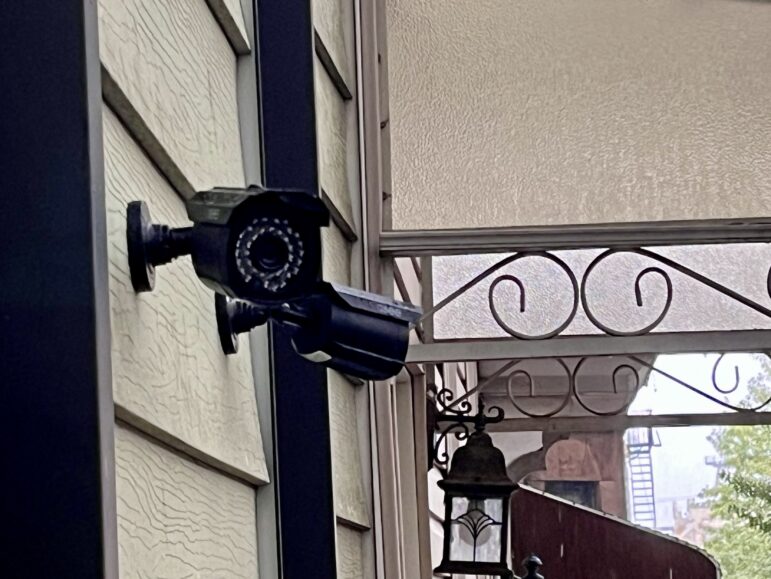“New York City Council’s new bill banning biometric data collection in residential buildings is a strong step forward to give tenants and their guests more protections from the encroachment of their landlords and from modern surveillance technologies.”

City Limits
“The landlord is trying to install a heat-mapping facial recognition hardware at the entrance of our building,” one tenant of the Atlantic Plaza Towers said to their fellow community members in Brooklyn.
That was in 2018, before they realized that it was going to take months to force the landlord to withdraw the application to install the hardware. Back then, heat-mapping facial recognition technology was still relatively new, and there had been zero legislation regulating the use of the technology.
After years of community-level organizing, the New York City Council finally introduced a bill (Intro. 1024-2023) in April of this year to limit biometric data collection in residential buildings around the city, which includes iris scans, fingerprints, voiceprints, palm prints, facial structure, movement patterns, and other sensitive information.
The introduction of this bill is the culmination of years of efforts by New Yorkers like those living in the Atlantic Plaza Towers to fight against new forms of digital surveillance by landlords. In 2018, community members were unfamiliar with heat-mapping facial recognition technology but immediately voiced concerns. This technology had never been used in residential sectors. It had not been tested and did not have proper validation.
After the hardware scanned your face, where was the biometric data being stored? Who had the power to access the data? Could the data be subpoenaed by the police department as a new form of draconian police surveillance? How were the residents supposed to just brush it off, if the NYPD could use the data to convict someone? In a community composed of majority Black and brown residents, it was impossible to ignore the potential deleterious effects that this new technology could bring.
Biometric data was only one of the many forms of data that landlords were collecting on their tenants back then, and are still collecting today. Even key fobs or radio-frequency identification (RFID) cards can contain personal information such as the tenant’s name, age, and address. In some buildings, smart access systems use GPS technology to track one’s location, even when one is outside the building. Landlords can then use all of the data they have collected to harass or even evict a tenant.
Considering the implicit biases in data collection algorithms and in society in general, it comes as no surprise that Black and brown people are disproportionately impacted by such harassment. In response to this form of data collection, the City Council introduced the “KEYS Act” (Int 0695-2022) last year, which gives tenants the right to a physical key so that they can opt out of potential data collection by their landlords.
Due to the lack of proper local and federal legislation, the space of biometric data collection is like the wild west. The concerns of Atlantic Plaza Towers residents were mired in the swamp of bureaucracy that is the state’s Homes and Community Renewal (HCR) agency. Meanwhile, tenants had no causes of action to bring their landlord to court. A shame-campaign was the their only way of seeking redress.
After being bombarded with press coverage of community members voicing their concerns for months, the landlord, Nelson Management Group, finally caved in and withdrew their application to install the much-hated technology in 2019.
Ever since then, the local legislative landscape has improved significantly to protect tenant rights with the passage of the Tenant Data Privacy Act (“TDPA”) in 2021, where data collection in residential buildings is largely regulated and limited.
When we are addressing community issues with new technologies, we tend to be drawn to the glitz and glamor of the technology itself, without realizing that surveillance technologies have real-life impacts on community members. Meanwhile, there have always been affordable alternatives that amplify community stakeholder-ship. Surveillance should never be the preferred way of addressing issues and it will only create more problems that our city does not have the capability of addressing.
New York City Council’s new bill banning biometric data collection in residential buildings is a strong step forward to give tenants and their guests more protections from the encroachment of their landlords and from modern surveillance technologies. At the same time, with legislative development on the local level, New York City is able to inspire more cities and states to join the effort of protecting their communities and may eventually lead to the passage of statutes on the federal level as well.
We urge the City Council to pass Int 1024-2023 and to ban biometric data collection in residential buildings once and for all.
Zuliang “Patrick” Li is a legal intern at S.T.O.P. and a rising second-year law student at NYU Law interested in the intersection between technology and social issues.
Fabian Rogers (he/him/his) is a constituent advocate for NYS Senator Jabari Brisport, a member of HOPE (Housing Organizers for People Empowerment), and BGJ (Brownsville Green Justice) in Brooklyn, NY. He has been on the frontlines with his neighbors resisting the use of surveillance technology, housing, and environmental injustice in his community.








